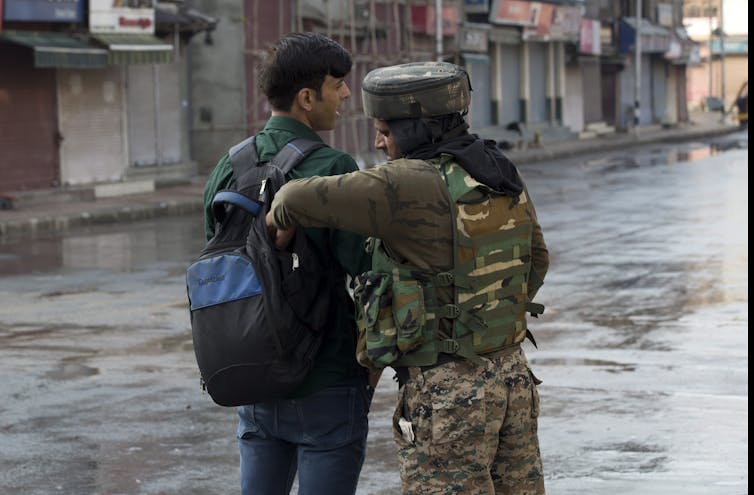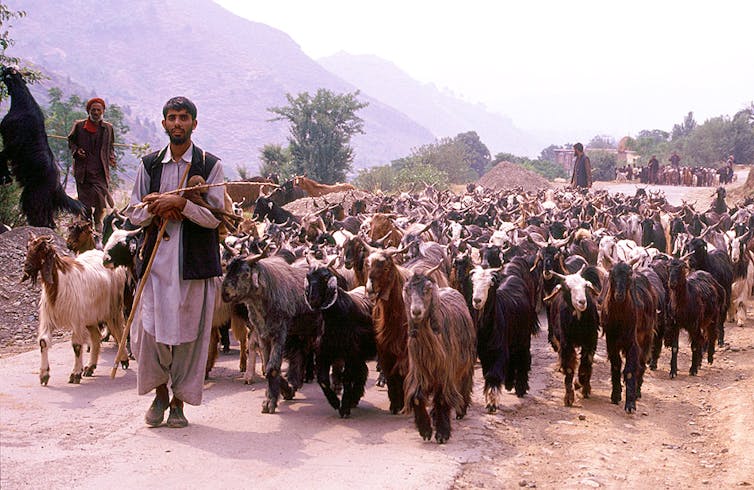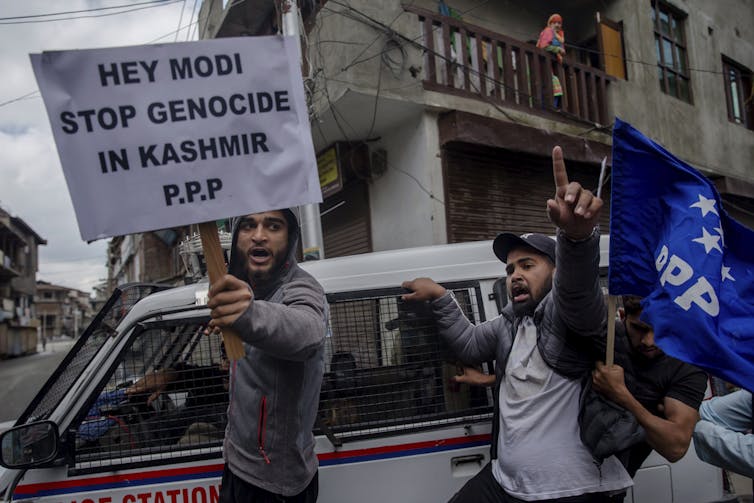
Binish Ahmed, Ryerson University
The Kashmir conflict, referred to as a “territorial dispute,” has been central to tense relations in Asia for more than 70 years, particularly between the two nuclear powers of India and Pakistan.
Tensions have escalated between the countries many times in the past and have sometimes resulted in military confrontation.
Kashmiris are an Indigenous people living under colonial occupation who have been fighting for their right to practise sovereignty through self-determination and self-government. Multiple colonial borders run through the Kashmiri peoples’ territories (Indian, Pakistani and Chinese), separating families and friends.
Kashmir is the most militarized region in the world, with more than half a million armed Indian troops deployed in the Indian-administered Kashmir over the past 30 years.
They are occupying Kashmir through use of colonial war measures acts, including the Armed Forces Special Powers Act, the Public Safety Act and martial laws that have given Indian troops complete impunity.
Gross human rights violations have occurred under their watch, according to a 2018 United Nations report. They include gang rapes by military and mass disappearances of approximately 8,000 to 10,000 people. As many as 100,000 Kashmiris have been killed and several thousand wounded, blinded and maimed, including through torture tactics in custody
As a result of the war, hundreds of thousands of Kashmiri (Muslims, as well as Sikhs and Pandits) have left Kashmir, and become internationally displaced and dispossessed following the 72-year Indian occupation.
India’s latest invasion
On Aug. 4, India ordered all tourists and outside students to leave Kashmir effective immediately. They simultaneously implemented emergency measures to protect tourists and Indian Hindu yathris doing an annual Hindu pilgrimage. It also airlifted almost 10,000 more soldiers into Kashmir within a matter of two days.
Approximately 28,000 additional armed troops then invaded Kashmir Valley in trucks and tanks.
On Aug. 5, the Indian Home Minister Amit Shah told parliament that the president had signed a decree abolishing Section 35a and Article 370 of the Indian constitution.
Read more: India revokes Kashmir’s autonomy, risking yet another war with Pakistan
The Indian government eliminated Kashmir’s special status in an effort to assimilate the Kashmiri people, extinguish their unique Indigenous title to land and claim their land as federal territory. This obliterated any last set of rights Kashmiris enjoyed as a semi-autonomous people in the Indian union of states.
Jammu and Kashmir State has been bifurcated into an Indian federal union territory.
These unilateral moves by the Indian state obliterate the rights Kashmiris had as citizens of India as well as their Indigenous rights. Under the United Nations Rights of Indigenous People (UNDRIP), India is obligated to ensure decisions pertaining to Kashmiri are made with them, using the principle of Free, Prior, Informed Consent (FPIC) that recognizes Kashmiris as a sovereign Indigenous people.
The UNDRIP was adopted and signed by India, China and Pakistan in 2007.
Millions under house arrest
Since Aug. 4, India has eliminated all access to and communication with Kashmir. The internet, mobile and landlines have been severed, and 14.7 million people have no access to essentials like food and medical support while Indian advances to take full control of their land using military power.
Aside from extremely rare media, Kashmiris have not been able to communicate with each other or with the outside world. The entire Jammu and Kashmir region is essentially imprisoned under house arrest.
Since 1949, Article 370 has granted the state of Jammu and Kashmir semi-autonomous constitutional status. Under its provisions, the region has its own legislative assembly, constitution, flag and independence in all matters except communications, foreign affairs and defence.
Revoking this status is the latest attempt to annihilate the Kashmiri people, extinguish their rights and eliminate their linguistic, social, cultural, economic and political existence as Indigenous people. The legality of dissolving the special status is being challenged by India’s legal and constitutional experts, and goes against the country’s Supreme Court rulings of recent years.
With these recent changes to Article 370 and Section 35a, India permits the permanent settlement of non-Kashmiris in Kashmiri land. Membership and settlement had previously been determined by the Kashmiri constitution. Non-Kashmiris are now allowed to purchase, acquire and permanently settle on land in Kashmir.
Under these changes, the Gujjar-Bakarwal people in Kashmir, for example, are immediately at greater risk. They migrate seasonally with animals on pastoral grounds, caring for both the animals and the land. India’s laws concerning land as individual property will not permit them to continue living on the land as they’ve historically done.

These changes will also result in a reconfiguration of the population in Kashmir. Kashmiris have long speculated that India intends to settle military and paramilitary families in Kashmir. As a Kashmiri, I have personally already seen semi-permanent military colonies in Kashmir.
Using an Indigenous framework
Indigenous peoples in Asia like the Kashmiri have long faced threats to their existence and their inherent rights, particularly “relational” land rights, as colonizing relations between Indigenous peoples and settler nations make land encroachment profitable and treat Indigenous lives as disposable.
Media, academics, legal and policy analysts barely touch on Indigenous rights, as outlined in the UNDRIP, when discussing Kashmir. But the Indigenous rights framework is necessary to accurately assess the distinct set of rights abuses Kashmiris face. India is in violation of multiple international human rights conventions and declarations it’s signed that apply to Kashmir.
Under UNDRIP, India is obligated to consult with Indigenous people rather than make decisions that impact them unilaterally, and to grant them the greatest possible opportunity for self-government and self-determination.
This right of Kashmiris to determine their future was also affirmed by a UN resolution on Kashmir in 1948. But this resolution limited self-determination to a decision on whether to accede to India or Pakistan.
There has been a reluctance to use the term genocide to describe the events that have unfolded in Kashmir over the decades.

But the legal definition of genocide fits. The Kashmiri people have been targeted for a demographic transformation on their territory by an outsider group by introducing mass permanent settlements of outsiders. The outsider group is the Hindu nationalist Indian state under the leadership of the Bharatiya Janata Party (BJP), and Prime Minister Narendra Modi.
Targeted for being Muslim
As a group, Kashmiris are additionally being targeted because they are predominantly Muslim as well as culturally and linguistically distinct. Muslims are treated as threats in India, including in Kashmir. They have been targeted for elimination in part through military force and economic oppression.
Kashmiri youth have been criminalized and put into state custody for “reform” programming for throwing stones to protest the injustices they face and the impunity of the Indian military. This treatment is a violation of the UN Convention on the Rights of a Child.
Refusal to call out genocide has happened before, in Nazi Germany, Rwanda and elsewhere. The United Nations Convention on Genocide states that it must never be permitted again. The convention also states that at-risk groups must be protected.
Instead, there has been an eerie silence from world leaders on naming the unfolding crime in Kashmir.
Kashmiris have been the guardians, gardeners and caretakers of Kashmiri land, water, each other and non-human life. Regardless of colonial borders, what is most fundamental is what Kashmiris, as a sovereign Indigenous people, want.
According to a popular Kashmiri protest chant that has reverberated through Kashmiri history:
“Jis Kashmir ko khoon se seencha! Woh Kashmir hamara hai!” “The Kashmir that has been drenched in our blood! It belongs to us, the Kashmiris!”
Binish Ahmed, PhD candidate, Public Policy, Ryerson University
This article is republished from The Conversation under a Creative Commons license. Read the original article.
